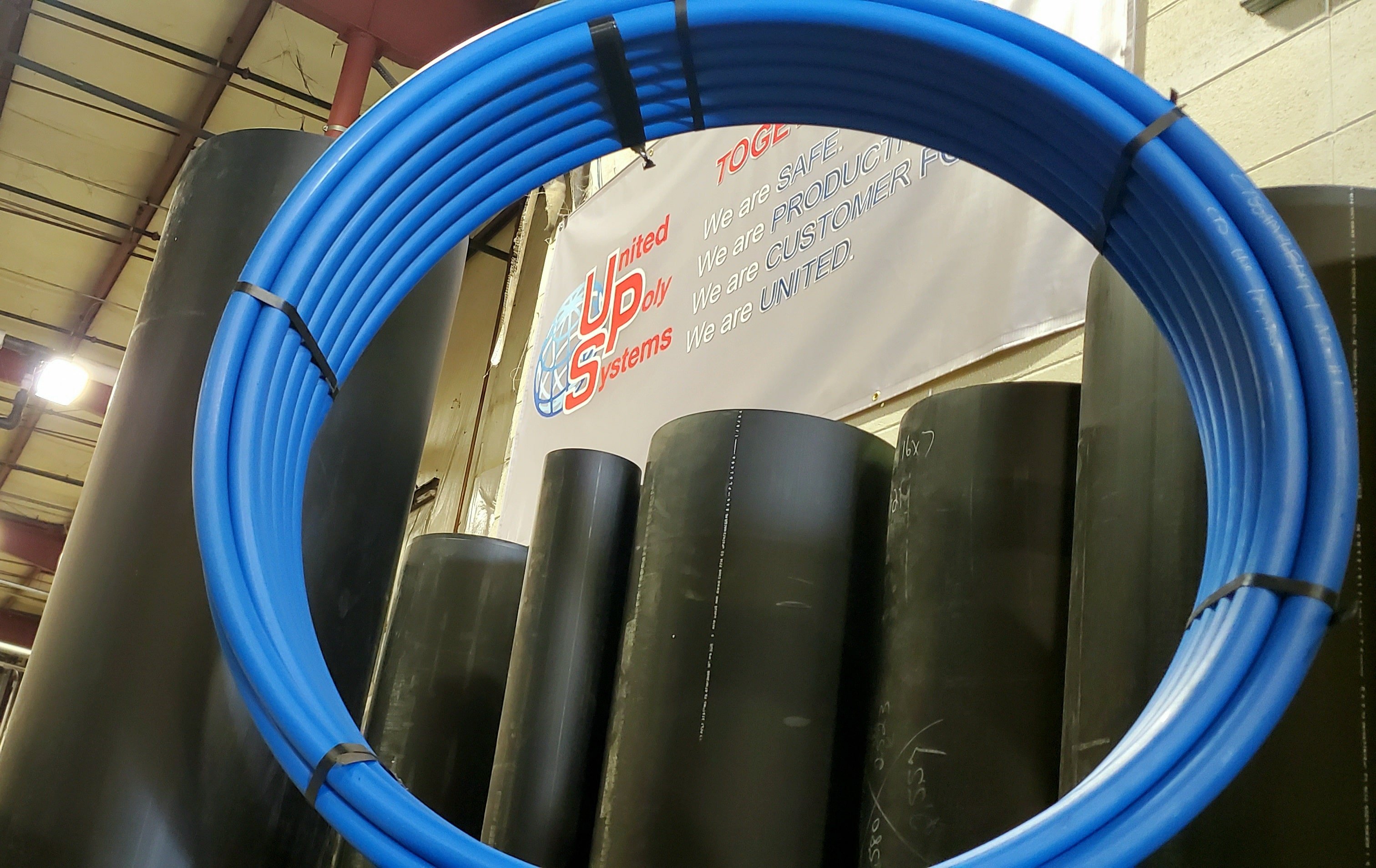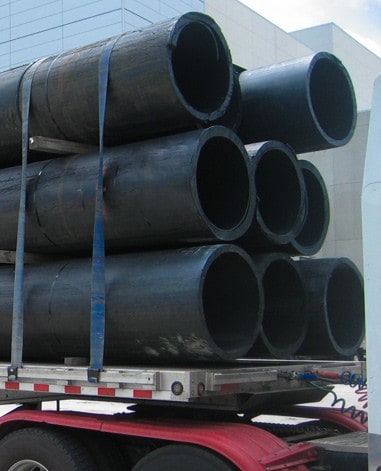Pipe Manufacturing Midland TX: Process Explained
A Comprehensive Guide to the Numerous Uses HDPE Pipe in Building And Construction and Market
HDPE pipelines have actually become an essential part in modern building and commercial applications. Their one-of-a-kind residential or commercial properties, such as resistance to deterioration and light-weight design, make them appropriate for a large range of usages. From water systems to agricultural irrigation, HDPE pipes provide options that boost performance and sustainability. Understanding their diverse applications is vital for professionals looking to enhance infrastructure. What certain advantages do these pipelines bring to each sector?
Water Supply and Distribution Equipments
Water supply and distribution systems are important components of metropolitan facilities, often counting on high-density polyethylene (HDPE) pipes for their longevity and performance. These systems transportation potable water from therapy centers to consumers, guaranteeing accessibility and security. HDPE pipes are favored for their resistance to corrosion, chemicals, and extreme temperature levels, which enhances their long life and lowers maintenance costs. Furthermore, their lightweight nature allows for easier installation and transport, making them suitable for various urban and rural applications.
The flexibility of HDPE pipes enables them to be set up in tight rooms and around barriers, minimizing the need for substantial excavation (Texas hdpe pipe manufacturer). Moreover, their smooth interior surface reduces rubbing losses, enhancing water circulation prices. As cities remain to expand, the demand for dependable supply of water systems enhances, positioning HDPE pipelines as a lasting remedy for modern-day facilities jobs. Their tried and tested track document makes them a favored selection amongst designers and city organizers alike
Wastewater Monitoring and Treatment
Efficient wastewater administration and treatment are vital for preserving public health and wellness and environmental quality. HDPE pipelines play an important duty in this process because of their longevity, resistance to corrosion, and capacity to stand up to severe chemicals. These pipes are generally utilized in numerous applications, including sewer system, stormwater water drainage, and wastewater therapy centers. Their light-weight nature promotes simpler setup and transportation, reducing labor prices and time.
Additionally, HDPE pipes have a smooth indoor surface that lessens rubbing loss, promoting effective flow rates. They are additionally much less prone to leaks and failures compared to traditional products, making sure that contaminants are consisted of efficiently. Their adaptability allows for versatility in numerous dirt conditions, making them appropriate for varied ecological setups. As sectors progressively focus on lasting practices, the use of HDPE pipelines in wastewater monitoring systems aligns with goals for reducing environmental influence and boosting source recuperation.
Agricultural Irrigation Solutions
In agricultural settings, efficient irrigation options are necessary for maximizing plant yields and handling water sources. HDPE (High-Density Polyethylene) pipelines play an essential duty in modern watering systems due to their sturdiness, i was reading this versatility, and resistance to rust. Their capacity to withstand high stress makes them perfect for both surface and subsurface irrigation applications, guaranteeing uniform water distribution throughout areas.
Farmers can make use of HDPE pipelines in drip watering systems, which provide water directly to plant roots, minimizing wastefulness and advertising healthy and balanced development. In addition, these pipelines are lightweight and easy to install, lowering labor prices and setup time. Their long lifespan and reduced upkeep demands even more enhance their allure in farming methods.
HDPE pipes are eco pleasant, as they can be recycled and do not seep dangerous chemicals into the dirt. This makes them a lasting choice for farmers intending to embrace eco-friendly farming approaches while optimizing efficiency.
Industrial Applications and Procedures
Adaptability is a hallmark of HDPE click now pipelines, making them essential in numerous industrial applications and procedures. These pipes are extensively made use of in chemical processing sectors due to their outstanding resistance to a large range of corrosive compounds. HDPE's light-weight nature, incorporated with high tensile stamina, enables very easy setup and lasting efficiency sought after atmospheres.
In the oil and gas sector, HDPE pipelines play an essential function in transferring hydrocarbons and gases, thanks to their durability and flexibility - Texas hdpe pipe manufacturer. Furthermore, they are utilized in mining procedures for the transport of slurry and various other products, where conventional piping systems might stop working
Furthermore, HDPE pipes are progressively utilized in manufacturing facilities for water system lines and wastewater monitoring. Their capacity to hold up against extreme temperature levels and pressures makes them suitable for a variety of industrial procedures. On the whole, HDPE pipelines add substantially to efficiency and safety and security throughout varied commercial applications.
Stormwater Administration and Drainage Systems
Stormwater monitoring and water drainage systems are critical components in urban framework, created to handle excess rainfall and reduce flooding threats. High-density polyethylene (HDPE) pipes are progressively utilized in these systems due to their toughness, flexibility, and resistance to corrosion. These pipelines effectively transfer stormwater away from booming areas, reducing surface drainage and stopping waterlogging.
HDPE's lightweight nature facilitates much easier installation, lowering labor expenses and building and construction time. basics Furthermore, its resistance to chemicals and environmental stressors assurances longevity and dependability in various environments. Along with standard drainage applications, HDPE pipelines are likewise used in ingenious remedies such as eco-friendly framework, that includes rainfall yards and permeable pavements.

Often Asked Inquiries
Exactly How Does HDPE Pipe Contrast to PVC Pipeline in Expense?
As a whole, HDPE pipe has a tendency to be more costly than PVC pipeline due to its improved durability and flexibility. Long-term expense factors to consider, such as upkeep and life-span, might prefer HDPE in specific applications.
What Is the Lifespan of HDPE Pipeline Under Diverse Conditions?
HDPE pipes commonly have a life expectancy of 50 to 100 years, depending upon ecological conditions, setup methods, and usage. Elements such as temperature, soil type, and exposure to chemicals can greatly influence their longevity.
Can HDPE Piping Be Recycled After Usage?
Yes, HDPE pipelines can be reused after usage. The reusing process involves melting down the material, enabling it to be repurposed into brand-new items, therefore advertising sustainability and minimizing environmental impact associated with plastic waste.
Exist Any Kind Of Certain Setup Difficulties With HDPE Pipes?
Installment difficulties with HDPE pipes consist of correct jointing methods, making sure sufficient trench conditions, and managing thermal growth. Additionally, experienced labor is required to manage specific tools, which can make complex the installation procedure in different environments.

What Certifications Should I Look for When Buying HDPE Pipes?
When purchasing HDPE pipelines, one must try to find accreditations such as ASTM, AASHTO, and ISO, which validate top quality and compliance with industry criteria, ensuring sturdiness and performance in numerous applications. - Midland TX HDPE Pipe Fittings in Stock